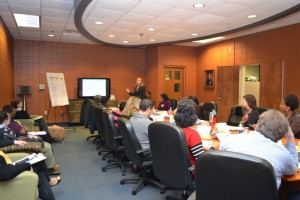About TF-CBT
Trauma-Focused Cognitive Behavior Therapy (TF-CBT) is a mental health treatment model designed for children ages 3- 18 who are experiencing difficulties after trauma exposure such as sexual abuse, exposure to violence, or a natural disaster. TF-CBT was developed by Judy Cohen, M.D., Anthony Mannarino, Ph.D. and Esther Deblinger, Ph.D.
TF-CBT is an evidenced-based intervention that is a SAMHSA best practice in the treatment of childhood posttraumatic stress disorder (PTSD). Features of TF-CBT:
- Treatment is short-term. On average, TF-CBT is completed over 18-24 weekly sessions.
- TF-CBT is skills–based. Families are taught many skills in sessions, such as relaxation, to reduce trauma-related distress. In order for treatment to be effective, therapists will also ask children and caregivers to practice and use these skills at home and other places where stress may occur.
- TF-CBT involves the family. Caregivers are actively included in treatment with their child and are key to successful outcomes. Typically, therapists in each TF-CBT session will spend individual time with the child, check in separately with the caregiver, and include combined family time. However, when a child does not have a caregiver who can be involved in treatment, TF-CBT treatment can still be effective in reducing childhood trauma symptoms.
- Sessions will be structured. TF-CBT therapists will have a planned focus for each session to cover skills and activities known to be important for reducing distress related to trauma.
- Treatment will be engaging to the family! TF-CBT therapists will strive to be creative and tailor activities to engage children and provide an enjoyable and safe treatment experience.

Foundations Trainings
Project Intersect’s Foundations Trainings provide intensive training in basic TF-CBT. These trainings are designed for therapists who may have only limited familiarity with the model, (or some knowledge and experience) but have not completed prior TF-CBT training and consultation with a approved trainer.
 Multiple in-person trainings (Learning Sessions) with a TF-CBT Faculty Trainer emphasizing active learning and sharing among participants
Multiple in-person trainings (Learning Sessions) with a TF-CBT Faculty Trainer emphasizing active learning and sharing among participants- Pre-work activities to ensure sufficient exposure to the practice prior to the first Learning Session (in-person training) and to prepare the participants to fully engage in the Learning Sessions
- Action periods between Learning Sessions during which participants are expected to participate in consultation calls, access resources, share improvements, work together to practice new skills, and implement and spread the practice
- Monthly or Twice-monthly consultation calls with a TF-CBT Consultant
- On-line collaborative workspace for sharing ideas, metrics, and additional activities to support successful learning.
- Metrics and Program Evaluation are essential components to the trainings (Participants are expected to participate in evaluation activities and review metrics reports)
A major aim is for clinicians to leave these trainings being able to implement and sustain TF-CBT with fidelity and improve outcomes for children and families.
Learning Community Eligibility Requirements
- Master’s Degree in Counseling, Social Work, Psychology, or related Mental Health Field
- Currently licensed or license-eligible and practicing under the supervision of a Licensed Mental Health Provider
- Currently providing therapeutic services to sexually abused and/or traumatized children as a substantial component of your current practice or supervising mental health providers who are doing so
- Note: Student interns will not be accepted
Cost
There is no fee for the training itself; however, participants should anticipate the following associated costs:
- Travel, lodging, and associated expenses to participate in two, two-day learning sessions
- Staff time to engage in the following activities throughout the 6-12 months of the Learning Community
- Completion of pre-work prior to learning sessions
- Participation in Learning Sessions
- Collection of data for improvement metrics and related activities
- Participation in evaluation activities
- Additional resources as needed including materials and equipment, computer use and internet access, resources for assessment and treatment
Learning Collaboratives and Learning Communities
Foundations Trainings are offered in Learning Collaborative and Learning Community formats. Both trainings include the elements described above; however, Learning Collaboratives involve the participation of a full team from community organizations that includes a senior leader, clinical supervisor and 2-to-4 clinicians. There are separate tracks for senior leaders and supervisors and the focus of the Learning Collaborative extends well beyond clinical training to include organizational processes that support implantation and sustainability within the participating organizations.
